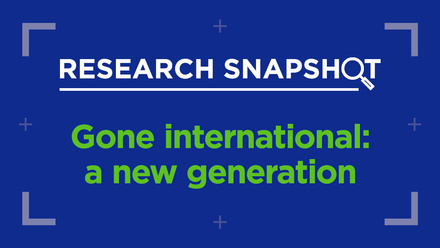Global internships: preparation for the new world of work

As the COVID pandemic increasingly becomes a distant memory, changes to the world of work which were accelerated by the pandemic are now becoming permanent aspects of our working lives, with significant implications for the role of higher education. Read this blog post for some insights into the changing world of work, how global internships are well-positioned to respond to these changes, and a special discount code to attend the upcoming Global Internship Conference in Berlin.
From the work environment (ie remote/hybrid/in-person), to the skills valued by employers, to the demands of the next generation of talent, the world of work is experiencing unprecedented changes that are forcing employers to adapt quickly to recruit and retain needed talent. In parallel, the value of higher education as a sure path into top careers and high-paying jobs is increasingly doubted by the public. In light of these emerging trends, what do higher education institutions need to do to help students develop skills that will make them attractive to employers and prepare them for a successful transition to the workplace?
Skills, degrees and talent shortages
There has been growing evidence that employers are increasingly moving towards skills-based hiring, particularly as labour markets tighten up. Yet, this does not necessarily mean that degrees are not valuable. Recent research conducted by the Burning Glass Institute found that, in the US, the Bachelor’s degree, on average, delivers an immediate 25 percent wage premium within a year of graduation – a dividend that held steady over the 12-year period that the organisation studied. Furthermore, having a Bachelor’s degree offers greater mobility for young talent, allowing them to move into positions with higher degree requirements at a much faster pace.
This suggests that, while employers are more flexible in their job postings, they are still rewarding those with degrees through higher wages and greater career mobility. As the report’s authors emphasise, this does not mean that institutions should become lax and ignore this growing public outcry for higher education institutions to do more in helping young people successfully transition into productive careers.
Demographic shifts provide a not-so-foggy look into the crystal ball: some countries will simply not have enough workers to fill jobs
These trends are accelerating at a time when numerous countries, particularly more developed countries, are facing unprecedented talent shortages – and it’s only going to get worse. Data from a recent survey by the ManpowerGroup indicates that 77% of employers are reporting difficulties in filling roles, a 17-year high. This challenge is particularly acute in more mature economies. Despite the high-profile layoffs and continued projections from economists of a potential recession in 2023, the long-term demographic shifts provide a not-so-foggy look into the crystal ball: some countries will simply not have enough workers to fill the jobs to sustain long-term economic growth.
In response to these talent shortages, more than 55% of employers surveyed by the ManpowerGroup also reported that they are willing to hire internationally to address growing talent scarcity in their countries. This, in fact, is a key strategy that is observed by the World Bank and encouraged by organisations like the Society for Human Resource Management.
Global internships: an essential strategy
So, what are the implications of all this, and why could global internships be an opportunity both for institutions who are trying to reinforce the value of degrees and employers who are seeking talent?
First, let’s define what global internships are. A global internship is a work-integrated learning experience where one works with an organisation outside one’s home or study country on a short-term basis (one month to one year). These experiences allow participants to apply learnings from the classroom to a work setting while gaining real-world experience in a global context. These experiences can be organised by the university in which students are (recently) enrolled, or facilitated by providers like CIEE.
Global internships allow participants to apply learnings from the classroom to a work setting while gaining real-world experience in a global context
While numerous studies have shown that internships enhance employability and are well integrated into the curriculum by higher education institutions, participation in internships outside one’s home country remains limited. In the US, for example, while about 60% of US students (representing over 2.1 million students) reported having completed an internship experience, IIE reports that only about 25,000 US students have worked abroad or completed an international internship. Even the Erasmus programme reaches less than 10% of European graduates.
As the world becomes increasingly global, it is imperative that institutions be more intentional in helping young people develop the intercultural competencies needed to successfully transition into and thrive in global workplaces. This all starts with work-integrated learning experiences like global internships. For employers, as global talent shortages continue to intensify, tapping into cross-border talent will be key to building new pipelines of talent, particularly to fill jobs with more specialised skills.
Tapping into global internships
Yet, taking advantage of the opportunities that global internships can offer is not so simple. For one, immigration policies do not always embrace cross-border talent. On the higher education side, establishing partnerships with employers in other countries is not so easy. The same for employers. Just the simple exercise of vetting which institutions or which employers to partner with is no easy feat. Furthermore, even when you’ve found the right partners, ensuring that students have a successful experience while managing the intersecting factors of language, culture, health and safety concerns is resource intensive. When we layer on top of this the need to ensure access for students from diverse backgrounds – be it geographic, racial, socio-economic or a host of other factors – the challenges seem endless.
The good news is that there are many examples of successful models which have overcome these challenges. At CIEE’s Global Internship Conference (GIC) taking place in Berlin, Germany on June 21–23, there will be an opportunity to learn more from the experts mentioned above and dig into case studies of successful models which have effectively leveraged global internships to prepare the next generation of talent for the global workplace while contributing towards addressing skills gaps and global talent shortage issues. EAIE members may register for the GIC at the CIEE partner preferred rate by using discount code "EAIE_300_GIC23".
As the world of work continues to evolve and demographics continue to put pressure on talent needs globally, it will be important for higher education institutions and employers alike to explore other promising pathways like global internships to help develop next generation of global talent.






